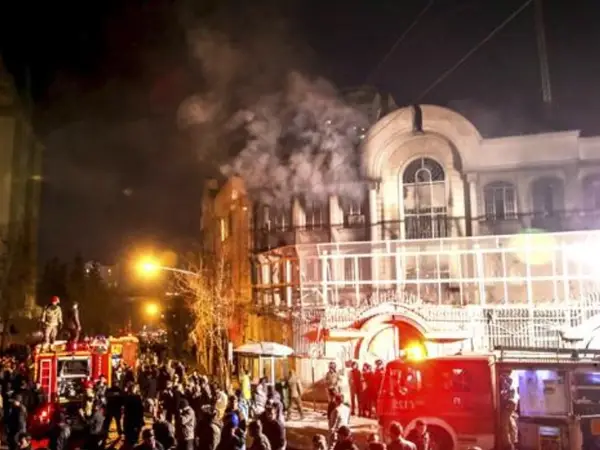The Iranian envoy to Baghdad, where Theran and Riyadh have been holding talks, says that the two regional tivals have agreed to continue the diplomatic process.
"Both sides had proposals that led to an agreement after the meeting Thursday [April 23] over a road map for future [talks]," Iraj Masjedi said according to the official news agency IRNA's report Friday.
Masjedi said the re-opening of embassies still needed to be negotiated but added that the agreement in the latest round was important as both sides needed a framework for future talks.
Masjedi said some of the agreements reached on April 23 included "building trust", as well as cooperation over matters such as acceptance of Iranian pilgrims for hajj in Mecca, re-opening of embassies, and "regional and internationals issues" but did not elaborate on any of these topics.
Nour News, a website affiliated to the secretary of Iran's Supreme National Security Council (SNSC), Ali Shamkhani, reported April 23 that high-ranking Iraqi and Omani officials had played an important role in organizing the meeting between Iranian and Saudi officials in Baghdad. Tehran and Riyadh. According to Nour News, representatives of Iran’s Supreme National Security Council (SNSC) and Saudi Arabia’s intelligence chief, Khalid bin Ali Al Humaidan, had attended the talks.
In his weekly press briefing Monday, Iran's foreign ministry spokesman Saeed Khatibzadeh said the talks in Baghdad were "forward-looking and positive". He also told reporters that initial talks were underway between Tehran and Riyadh on acceptance of 40,000 Iranian pilgrims to Mecca this year.
Iraqi Foreign Minister Fuad Hussein has said the Saudi and Iranian sides reached agreement on a 10-point memorandum of understanding (MoU) during the fifth round of talks. “The Saudi-Iranian dialogue in Baghdad discussed the continuation of the ceasefire in Yemen”, he said, noting that this round of talks came at the request of Oman.
Predominantly Sunni Muslim Saudi Arabia and Shi'ite Iran started direct talks in Baghdad in April 2021 for possible rapprochement and held five rounds to resolve their differences and ease tensions in the Middle East where they have been supporting opposite sides but so far there has been no breakthrough.
Iran suspended the talks in March without giving a reason as a new round of talks was due to start. The suspension of talks came after Saudi Arabia executed 8, including 41 Saudi Shiites, in its biggest mass execution in decades.
They have been at odds particularly over Lebanon where the Iran-backed Hezbollah has grown its political power, and influence and Yemen where a Saudi-led coalition has been at war with Iran-backed Ansarallah, also known as the Houthis, since 2016.
Saudi Arabia has also repeatedly voiced concerns over Iran's nuclear program and its long-range ballistic missiles. The United States, its Western allies and others blame Iran’s drones and missiles for Houthi attacks on Saudi and Emirati energy facilities.
Riyadh severed ties with Tehran in January 2016 and expelled Iranian diplomat after mobs stormed the its embassy in Tehran and its consulate in Mashhad in protest to the Saudi's execution of a Shi'ite cleric, Shaikh Nimr al-Nimr.
Protesters ransacked and set fire to embassy offices. Iran has never officially apologized for the incident. Then-president Hassan Rouhani, however, in a speech in June 2021 accused his hardliner rivals of sabotaging relations with Saudi Arabia by attacking the Saudi diplomatic missions. "May God never forgive those who did not let our relations with some neighbors improve," he said.
